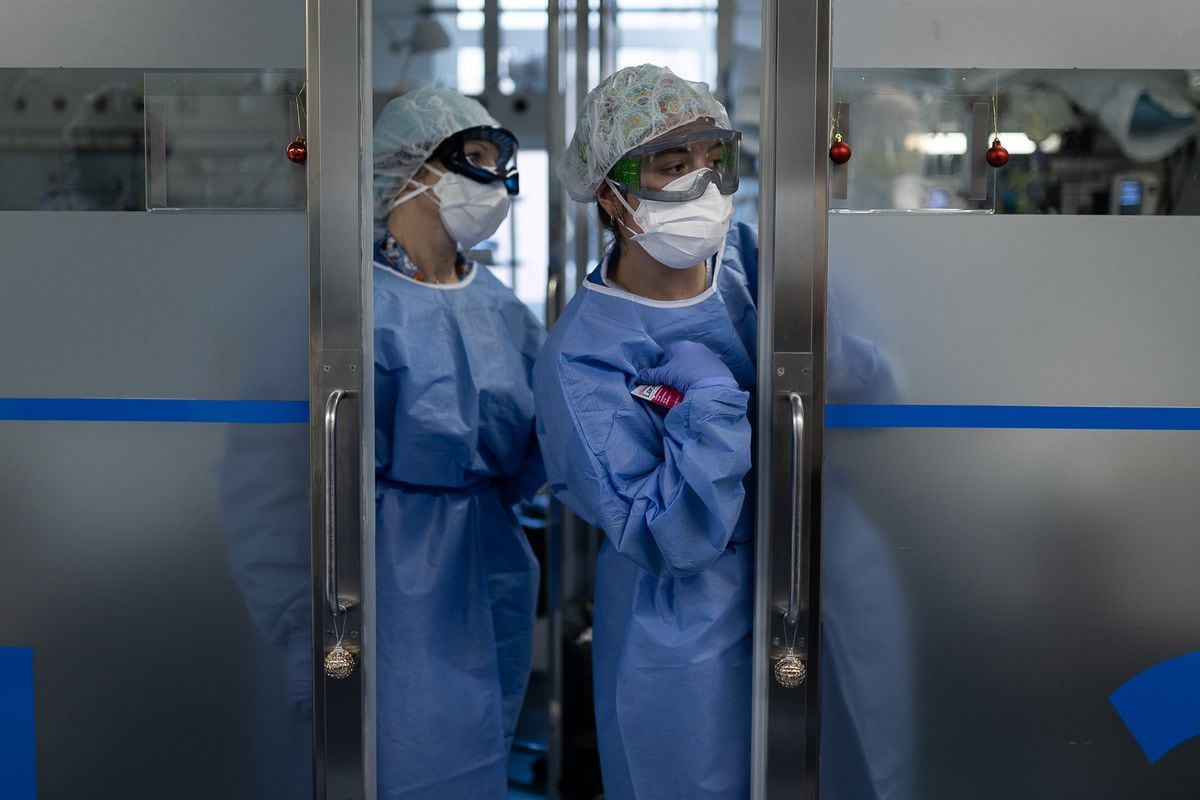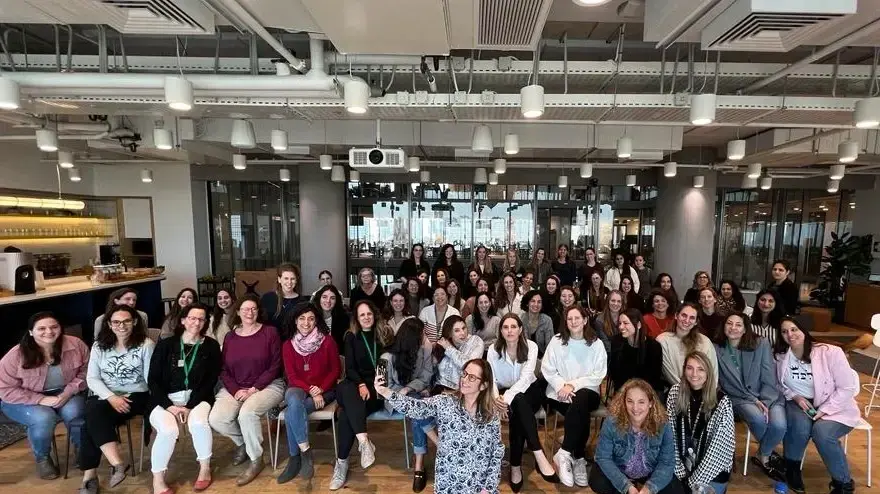news
News in Israel
Society and welfare
The future labor market: Hundreds of thousands of workers at risk of dismissal, a minority of high-tech women
State Comptroller Netanyahu Engelman attributes a significant portion of his report to difficulties in training older workers in the changing labor market, and even criticizes the state's difficulties in expanding the workforce to the high-tech industry.
According to him, there is a difficulty in realizing the potential of Israeli students among girls, Arabs and ultra-Orthodox in preparation for their employment in the industry.
Tags
State Comptroller
Working
Hi-Tech
Math
Vocational training
Sonia Gorodisky
Monday, 15 March 2021, 14:30 Updated: 14:45
Share on Facebook
Share on WhatsApp
Share on general
Share on general
Share on Twitter
Share on Email
0 comments
Difficulties in training workers for the future labor market.
Office towers in Tel Aviv (Photo: Reuven Castro)
State Comptroller
Netanyahu Engelman
devoted a significant portion of his report, which is published today (Monday), to training and adapting to the future labor market alongside state actions to strengthen the workforce in the high-tech industry.
According to Engelman, hundreds of thousands of workers are at risk of unemployment due to the way the state treats adult training in the world of work.
The auditor also devotes a portion to English studies in high schools and vocational training, and argues that they do not meet the needs of the changing labor market.
He also points out that despite the importance of the high-tech industry to the Israeli economy, the education system is having difficulty realizing the potential of students in the general sector and students in the ultra-Orthodox sector and expanding the number of university students in a way that expands the industry.
The main points of the auditor's references to adjustments to the changing labor market
The lack of a government body that centralizes the field of
training and learning in order to adapt them to the future labor market
Studying English
in high schools and vocational training for adults
does not meet the needs of the
changing labor
market
The education system
does not realize the potential
of students in general education, and in the ultra-Orthodox and Arab sectors
for future integration in high-tech
Barriers in
the higher education system
and the lack of leverage
in the defense system
make it difficult to
increase the workforce for the high-tech industry
Government programs for the integration of
women in the high-tech industry
are
implemented and implemented
without systemic planning
The auditor's report shows that about 600,000 workers in Israel are employed in jobs with a high risk of a material change in character, which constitute about 15% of the jobs, and may become unemployed in the coming years.
Alongside them, about 2.1 million workers are at medium risk, about 54% of jobs.
In an age of technological change, intensified in the Corona Age, workers who do not acquire the required skills and knowledge may be thrown into the cycle of unemployment, and those who are particularly exposed to this are workers from Arab and ultra-Orthodox society and low-skilled workers.
Despite the troubling data, the auditor found that only 53,000 people participated in the publicly funded professional and technological training in 2018.
The report shows that the vocational training system is cumbersome, trains too few employees and does not sufficiently involve employers.
"The professional and technological training system is decentralized, and its parts are usually not coordinated with each other in key aspects," it was written.
More on Walla!
Finance forecast: Unemployment is expected to fall to 6.5% by the end of the year
To the full article
More in the State Comptroller's report
Technology education in Israel is failing, and the Ministry of Education does not know how much
Only a third of the large bottles in Israel are recycled - and the rest pollute the environment
Suffering from flatulence?
Free demo for an innovative Israeli development that will prevent pain
The level of education does not match the needs (those photographed have nothing to do with what was said) (Photo: Flash 90, Hadas Porush)
Thus, for example, courses in similar professions include different pedagogical content, there is no single website that centralizes for the public all the training options and there is no unified procedure of diagnosis, guidance and recruitment.
The auditor writes that "the lack of inclusion impairs the utilization of resources and makes it difficult to adapt the training to the needs of the changing labor market and the needs of different populations."
It was further found that there is no single government entity that centralizes the field of adult learning and leads the issue of skills required for the changing labor market.
The multiplicity of public bodies that provide a solution may make it difficult for the public to recognize the variety of options available to it.
Also, a relatively large proportion of adults - 25% - wanted to participate in learning or training but did not do so for cost reasons, compared to an average of 16% in OECD countries.
According to the report, 29% of every yearbook of young people, many of them from weak socio-economic backgrounds, do not participate in either funded training or academic studies, and this may harm their integration into the labor market.
The studies do not suit the changes (the photographers have nothing to do with what was said) (Photo: Reuven Castro)
He goes on to say that Engelman warns about English language studies in high schools and vocational training for adults.
He believes that the studies are not suitable for the needs of the changing labor market.
About 40% of twelfth-grade students were tested in English at the level of three study units or were not tested in English for matriculation at all in the 2019-2018 school year - many of them from localities ranked in a low socio-economic cluster.
The State Comptroller recommends that "the relevant government ministries - headed by the Ministry of Labor, the Ministry of Education, the Ministry of Economy and the Ministry of Finance - jointly examine the existing vocational and technological training system and ways to update it, the provision of adult learning programs and their access to the most needy populations. Of the employees in accordance with the above recommendations. "
Most of the examinees - in strong schools
Along with training for adults, the State Comptroller also points out a shortcoming in realizing the potential at younger ages in the science-technology professions - in a way that makes it difficult to integrate into the Israeli high-tech industry.
In a chapter devoted to state actions to increase the number of workers in high-tech professions, the comptroller argued that although Israel is considered the "start-up nation," there is difficulty in realizing the potential among students in the general sector, as well as among all Arab and ultra-Orthodox students.
In the explanatory memorandum, it was argued that various international entities anticipate far-reaching changes in the market due to the integration of advanced technologies.
In July 2019, the number of vacant technology jobs in the high-tech industry in Israel was estimated at approximately 18,500.
The Comptroller warned that a chronic shortage of skilled workers in the high-tech industry in Israel is a strategic threat to the technology sector in particular and to the Israeli economy in general.
Despite this, according to the comptroller, most of the examinees at the level of five study units in the scientific-technological professions - which is a tool for integration in this industry - are in socio-economically "strong" schools.
Also, and about 3,000 of the examinees in five units in mathematics in schools are unable to study computer science, mainly due to a shortage of teachers.
Thus, more than half of the examinees in the five units of study in mathematics and computer science (53% and 55% respectively) belong to the stronger schools.
In contrast, only 8% of them belong to the "weaker" schools.
The Comptroller recommends that "the Ministry of Education formulate a plan to remove the barriers to increasing the number of students in the science-technology subjects in high school and work to realize the potential of all students, especially in those who take five credits in mathematics." -tcnologiim, as well as about students orthodox and Arab sectors.
auditor commends the initiative "five double" of the Ministry of education initiative has managed to double the number of graduates with a maturity of five units in mathematics from about 9,000 in 2013 to approximately -18 thousand in 2018 It was also noted that the higher education system met the target set by the government, and as early as 2019-2018, the increase in the number of students who began studying high-tech subjects at universities was about 40% compared to 2016-2015.
22% of computer science students do not complete their degree
Later, Engelman points to barriers in the higher education system, which also make it difficult to fill jobs and expand the supply of workers to the Israeli high-tech industry.
According to him, the lack of skilled academic staff and a high dropout rate of students in the relevant departments make it difficult to expand the number of university graduates in high-tech professions.
Thus, 22% of students who began studying computer science at universities did not complete a degree within six years.
In addition, 20% of students who began studying this profession completed a degree in another profession.
Despite the alarming picture, the Planning and Budgeting Committee (PTA) did not set targets for increasing the number of faculty members and reducing the dropout rate. PTA also did not ask the universities to examine the reasons for the dropout of students.
Regarding the aspect of leveraging military service in favor of increasing the skilled manpower for the high-tech industry, it was found that the Ministry of Defense did not formulate an operative plan for leveraging military service in the IDF, as required by the government decision in this regard.
The barriers on the way to the high-tech world
Only 8% of the examinees in five units in mathematics and computer science - from localities with low socio-economic status
22% of computer science students - did not complete a degree within 6 years
20% of computer science students completed their degree in another subject
The share of women in high-tech - 22%
It also emerged that in 2019 the share of women in the high-tech industry in technological positions was about 22%, and in technological management positions - 18%.
The auditor's report states in this context that "government programs for the integration of women in the high-tech industry are implemented and implemented without systemic planning."
The State Comptroller noted in the report that in order to ensure the continued definition of the State of Israel as a "start-up nation", it is appropriate that the relevant government bodies - MLAG, Ministry of Finance, Ministry of Education, Ministry of Labor, Welfare and Social Services, Innovation Authority and Ministry of Defense The barriers in the subject.
Ministry of Education: Formulate a work plan
The Ministry of Education responded: "The auditor's report covers the years 2015-May 2020. The ministry is currently filling technological gaps that have been widening over a decade or more. In light of this, it has formulated a comprehensive national program, the 'digital classroom', NIS 1.2 billion As part of this budget, 150,000 laptops were purchased, which were distributed to all students who could not reach them, along with a communications package. In addition, about 65,000 kosher phones were purchased for ultra-Orthodox students. The ministry upgraded the technological infrastructure in 4,600 educational institutions. Along with the possibility that the directors of the educational institutions will acquire digital content. In addition, training was given to about 200,000 teaching staff in the field of distance learning, and the digital content database with rich and varied content was significantly expanded.
It is also stated that "alongside this extensive infrastructure. Work in schools in the cultivation of 21st century skills, which include digital literacy, information literacy as well as linguistic, mathematical and scientific literacy.
In addition, he works to promote critical and creative thinking.
The innovative technologies, along with the advancement of the strategic program for the cultivation of 21st century skills, will provide a solid infrastructure for the training and integration of graduates of the education system in the changing labor market.
As for the ministry's actions to increase the number of graduates entering the high-tech market, it should be noted that over the past few years, the ministry has doubled the proportion of students in an increased track of five study units from 8% to 16%.
Also, over the last few years (2019-2017) there has been an increase of about 6% in the rate of graduates eligible for technological certification, and today it stands at a total rate of close to 60%.
Moreover, in those years there was an increase of more than 2% in the rate of technicians and engineers.
Today, their total rate is about 43% of the graduates.
"The ministry is currently formulating a work plan to promote the representation of students in the science professions, including computer science and cyber."
Share on Facebook
Share on WhatsApp
Share on general
Share on general
Share on Twitter
Share on Email
0 comments















